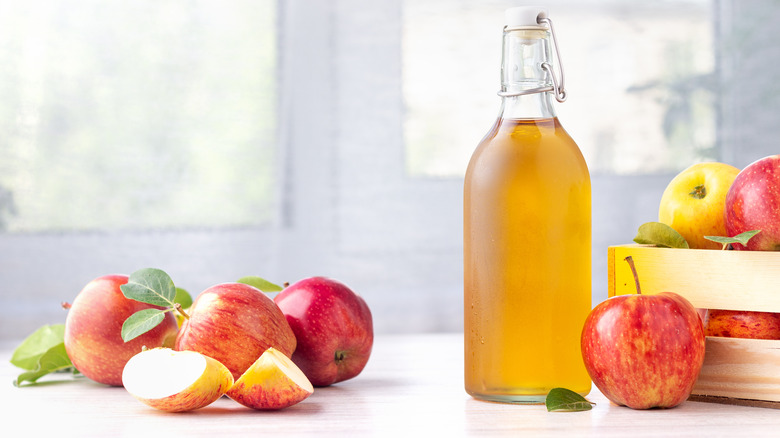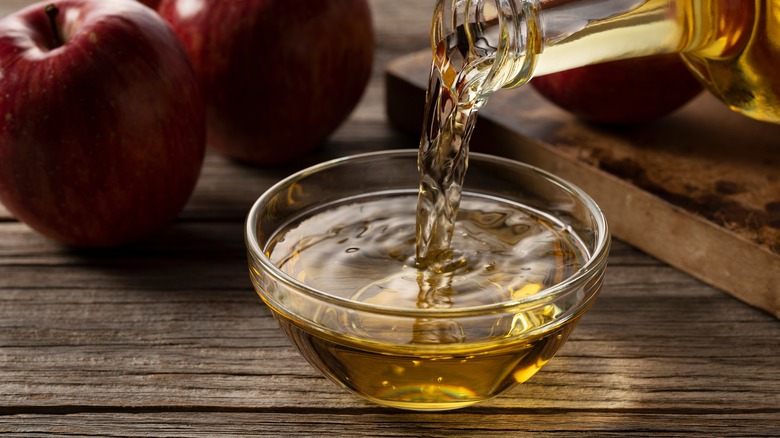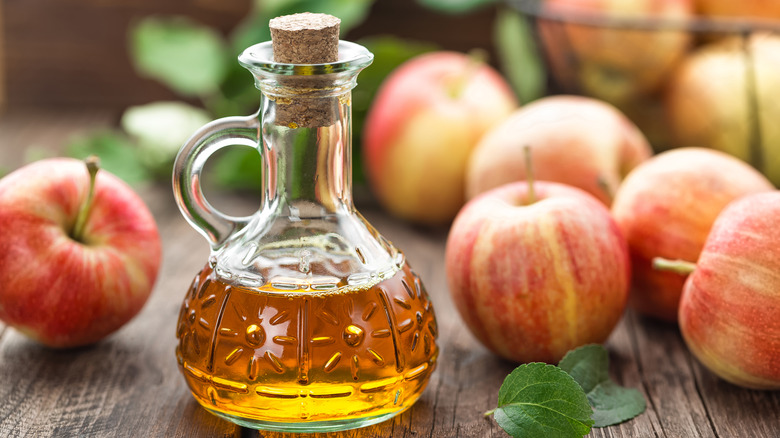What To Do If Your Apple Cider Vinegar Looks Cloudy
Apple cider vinegar — also commonly referred to as ACV — has been used for centuries as a natural remedy for a variety of ailments, according to MyMed.com. Some people tout ACV for weight loss, but this is disputed by the Mayo Clinic, which says there's no scientific data supporting this claim. Per Healthline, some studies have shown that ACV does help with regulating blood pressure, though. And Medical News Today states that there is some evidence to suggest it aids in digestion.
The beauty world also loves apple cider vinegar for maintaining glowing, clear skin and supporting healthy hair, which Healthline says may be true, since ACV is rich in vitamins and minerals, like vitamins C and B.
When it comes to the taste, though, some people aren't too keen on the bitter and tangy flavor of ACV, so there are now ACV supplements, allowing people to bypass the taste while still ingesting apple cider vinegar. If you don't mind the taste, though, you may have a bottle of the liquid sitting around. Have you ever noticed that there are times when your apple cider vinegar looks a little cloudy? There's a reason for that and a way to fix it.
Checking apple cider vinegar for mother
WebMD says that apple cider vinegar is made by fermenting apples, which creates acetic acid, the main active ingredient in vinegar. With fruit being the main ingredient, you may be concerned that apple cider vinegar goes bad, but don't worry. Because of its acidity, ACV has a relatively long shelf life and does not spoil easily. Per Can It Go Bad, the shelf life of ACV is five years if it's unopened, and two years once it has been opened. POPSUGAR. says you don't have to refrigerate apple cider vinegar unless you want to, but you should keep it away from direct sunlight, which can speed up the fermentation and make it go bad faster.
While ACV does not go bad in the traditional sense, it can change over time. The vinegar can become cloudy with a chemical that is called the "mother," which is a natural byproduct of fermentation, according to MasterClass. The mother is a collection of enzymes, proteins, and beneficial bacteria that can be consumed or removed. If you see it, it doesn't mean that the vinegar is spoiled.
Using the mother of vinegar
If you don't want to drink the mother, you can cap the vinegar bottle and shake it to help get rid of the cloudiness. If that doesn't help, you can also use a fine strainer or a coffee filter to strain the mother out of your vinegar. In general, though, if your ACV still has a strong, tangy taste and smell, it's safe to use. If it has lost its flavor or has a strange smell, or if you can't get the mother out to get to the texture you want, it may be best to discard it and purchase a new bottle.
If you do manage to strain the mother, you can use it to create your own vinegar. According to Revolution Fermentation, the mother of vinegar can be used in any alcoholic beverage that you'd like to turn into vinegar. Traditionally, alcohols like wine, beer, and cider were used, but you can use mother to turn any alcohol — like rum or vodka — into your very own flavored vinegar.


